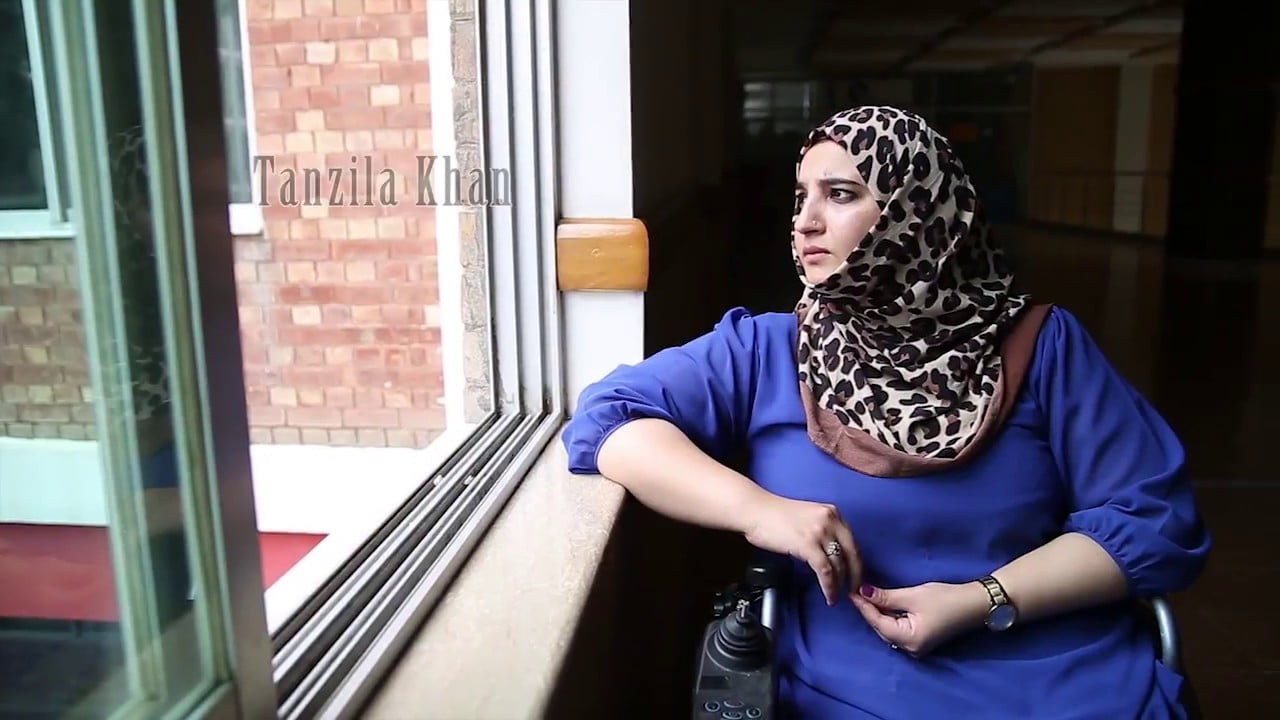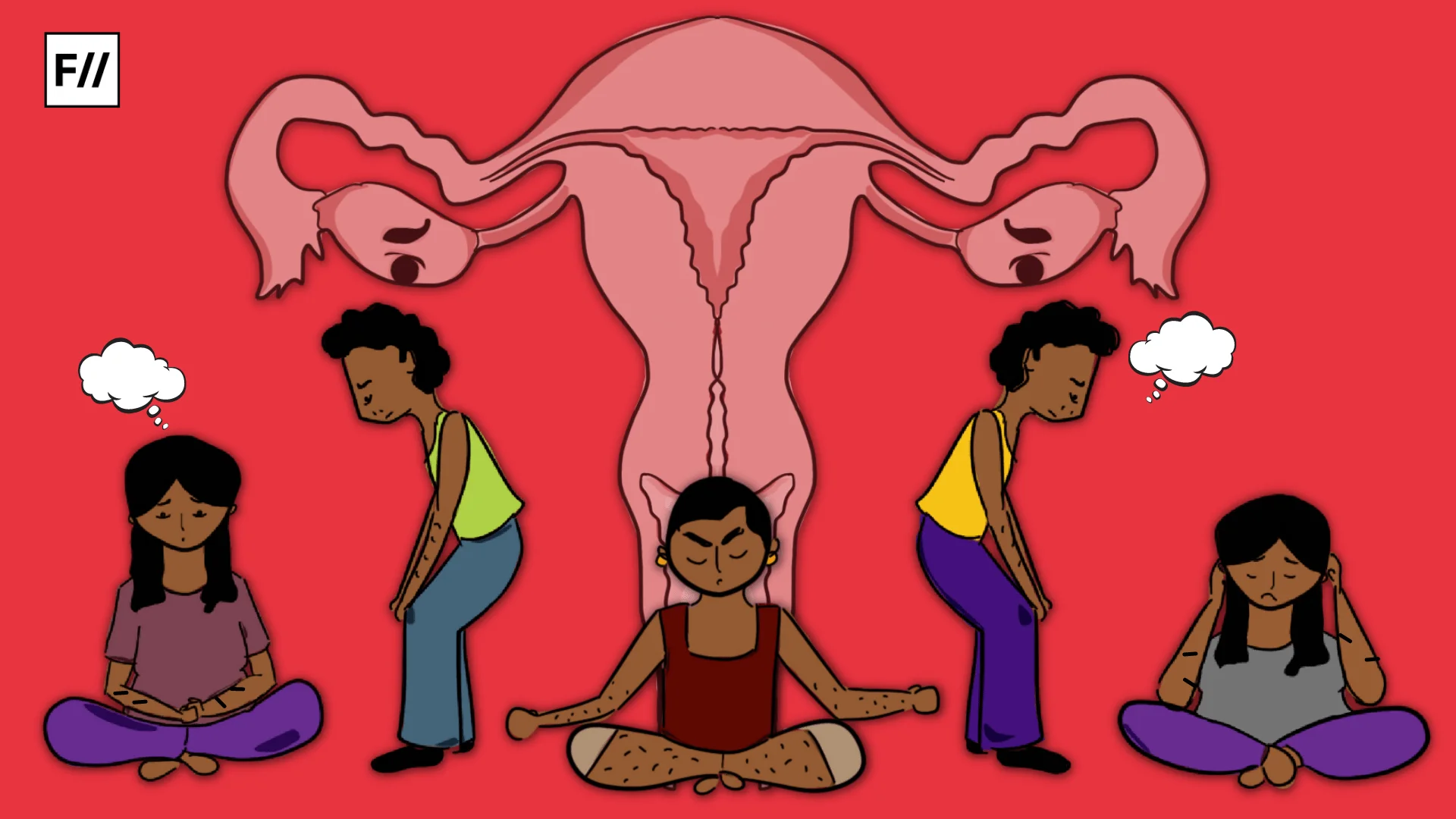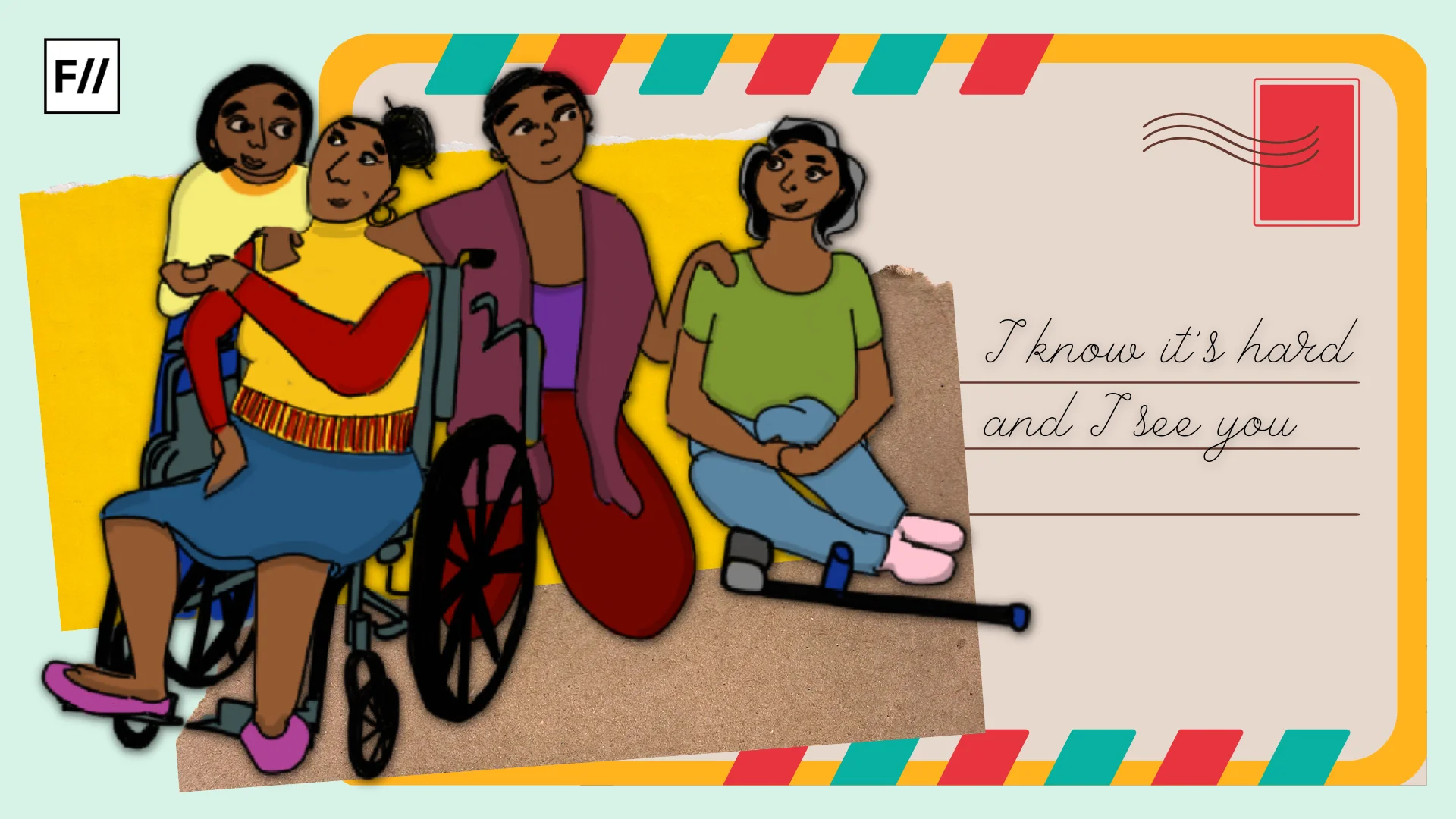Girlythings is an application-based start-up, which provides delivery service for products related to women’s menstrual hygiene, including, but not restricted to sanitary pads. A range of products like toilet-seat covers, hair removal creams, and many more can be found here, which women may otherwise be hesitant to buy from shops. The app was launched by Tanzila Khan who is a Pakistani disability rights activist and a published author.
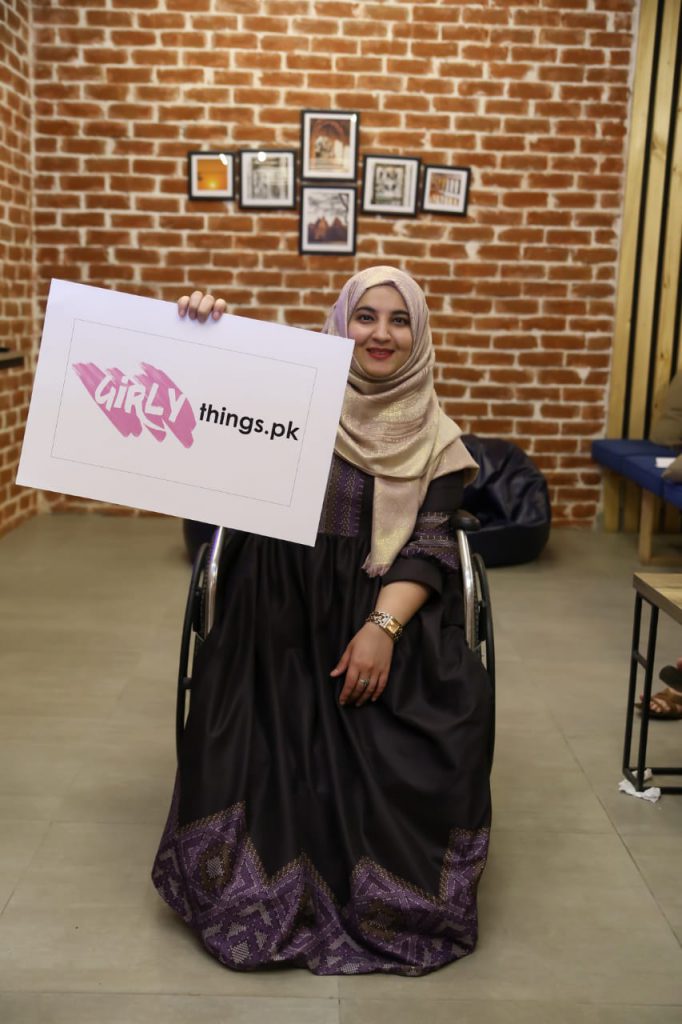
The two books she has written, A Story of Mexico and The Perfect Solution both helped her support and fund community projects in the fields of disability, women empowerment, education, and environment. She is a soft skills trainer in the development and corporate sector and has several titles like Women Deliver Young Leader, Entrepreneur at Accountability Lab, Youth Champion’s Initiative Fellow and Young Connector of Future-Swedish Institute.
Read below to learn about her concept for her latest achievement of launching Girlythings and how her life experiences created a vision for the same.
Dhwani S: Could you talk a little bit about Girlythings, and how the idea to start it came about?
Tanzila Khan: Girlythings is basically a mobile application through which we deliver sanitary napkins to women at home. We also have other products like toilet seat covers, hair removing creams – everything that women require for their hygiene but they are shy to buy from the shelf because of the awkwardness or taboo built around it. The idea actually came to me one day when I was travelling around and I tried to seize the day but suddenly my period started. At that moment, I realised that there wasn’t a single shop in my vicinity that was wheelchair accessible.
Girlythings is basically a mobile application through which we deliver sanitary napkins to women at home.
I felt it unfair that women have these barriers towards something that is so natural. I realised that we need to sort out the most basic problems first. That day, I went home and came up with the idea to create a system and integrate technology with it, because it was more doable. So, we came up with an app. Now we deliver. We also deliver in urgent situations. We run articles on the app for authentic information and also have quizzes on the app in which users can participate and get points called peridots. They can then shop on the app using those points.
DS: Did the idea for Girlythings come from your personal experiences while trying to purchase products that some women are uncomfortable confronting men about?
TK: As I mentioned already, my personal experience with accessibility brought about the idea. The idea pretty much came from this general perspective that is prevalent in South Asia. As I’ve travelled a lot and met other women, I noticed that no matter how empowered the woman is, when I ask her if she has ever had an experience feeling awkwardness while purchasing pads, and she says yes. And here we are, independent women, yet facing these issues. So, I think we need to divert our independence and our leadership towards something that is more basic and then build on top of it. Our careers and our education come quite later.
We need to ensure that we have a system of taking care of our menstrual health first. A lot is related to that – our self-esteem, our confidence, our physical appearance, our fertility and how we take care of ourselves for the later years when we are of a much older stage. So, the idea came from personal experience but the inspiration is generally from women across South Asia, in fact, globally.
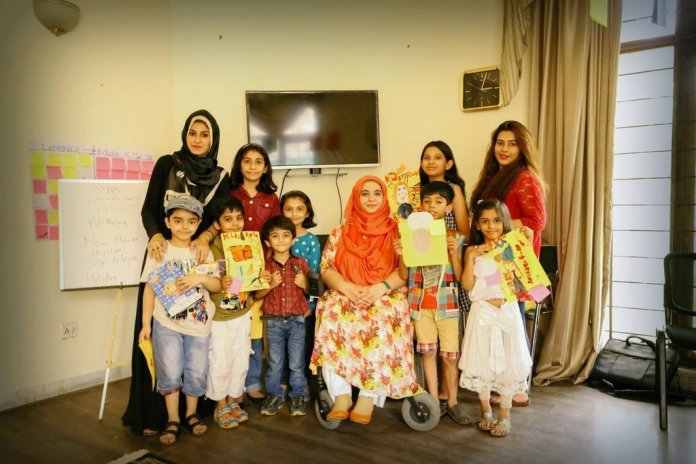
DS: What are the kinds of products that you want to focus on in the future?
TK: I think, starting from health, products related to reproductive health, menstrual hygiene. But we also want to expand into other products like contraceptives, or condoms or pregnancy related products, and then move towards beauty and organic skin care, and health related products which are healthy and they are not filled with toxins. Because many products out there, many cosmetics are full of toxins, that is why women have a higher ratio of cancer also. So, I hope that this platform is something that offers women a very healthy outreach to products that are safer to use. I really hope that this becomes the number one platform for women to order products at home and we can empower women with and without disabilities
DS: Is there a reason why the website doesn’t talk about the products that are available?
TK: No, not really, there is no reason. We are working on it. Since it’s a start-up, we’re in the growth phase. But definitely whatever we’re selling will be up on the website very soon. I know why this question came up, it looks as if we’re trying to conceal something. Girlythings is not just about selling products but also triggering conversations and making sure that people understand that its okay to see, feel, like something, believe in it, see it every day. These are the ingredients for acceptance. So, we are okay listing out products, its just taking time because we are a start-up.
DS: How is Girlythings different from a Big Basket or its equivalent, assuming the same products are available at these platforms as well?
TK: Definitely, e-commerce is expanding. Products like these are already available on many platforms even in Pakistan. But here’s the difference. Menstruation is not just a consumer experience. It has a lot attached to it and directly affects a woman’s experience, of being a woman. So, I think, there has to be a platform which has that sensitivity. I’m not saying that it has to be run by only women. We have men on our team, but the men that we have on our team, work on this start-up with a sensitivity towards women. They have a vision. Every time we picture a user, we think about a young girl who has ambitions, who has goals. I wonder if other people who are also selling televisions and crockery also think to this extent. I think we need to be more focused on a mission to have a vision that this is the generation that we have to raise.
the difference between us and other platforms is that our vision is to see our user confident and achieving her goals.
So, the difference between us and other platforms is that our vision is to see our user confident and achieving her goals. That is our mission, not to sell products. You’re right, Big Basket can do that, Amazon can do that. We don’t mind, we are their purchasers as well. But our mission is to see our users with more confidence, aiming to believe, and not being scared of the arrival of their period, and think that they cannot climb a mountain, or not give a presentation. That is our mission and that is our vision.
DS: Do you plan to introduce products like contraceptives, and other forms of protection in the near future?
TK: Definitely, why not? There is a huge market. There is a huge need. There is awareness. We need to bridge the gap, we need to eliminate the vacuum that is in between and make sure that women feel comfortable. They need to be given the choice of deciding what to do with their bodies. A lot has to do with the products and services available to them.
DS: Do you plan to include sustainable menstrual products like cloth pads, menstrual cups and bio-degradable pads in the range of products?
TK: Definitely. Like I keep saying, the feminism that we follow believes in choices, so I think having a variety gives women the power to choose whatever method she wants to use to experience her menstruation. Just because we only sell sanitary napkins, it’s telling our users that this is the only option you have. What if she doesn’t want to use that? There have to be more options may it be tampons or a menstrual cup, or may it be reusable. I know a lot of women who still cloth or cotton. So, we need to make sure that we have choices on the app.
DS: Do you think creating awareness about the harmful effects of plastic sanitary products on our bodies and the environment is important, and how can it be done through Girlythings?
TK: Definitely, it is very important. One thing we’re also working on is the disposal. Many a time, women struggle with the disposal. We need to also understand how much time it takes for one pad to decompose. Now, we cannot solve all the problems together, we need to focus on one thing at a time. Pads are being utilised by women all around the world, so disposal can be a method that ensures that there is the least harm done to the environment. Women usually just throw it (the pad) away and it is also very dangerous for the person who is picking the trash. It is a violation of human rights to make people clear each other’s mess as it is highly degrading. This should be done in a more dignified way.
For now, we have created a paper box, so, women can throw their used pads in this box which can be sealed and sent directly to the furnace. It doesn’t have to be opened, it doesn’t have to be thrown in the water or collected in the junk, it can just be burnt away. So that is what we’re working on, but we still have to test it and find out what are the effects are, once it is burnt.
DS: What was the thought behind including quizzes on the application?
TK: I think quizzes are a fun way to engage anyone, ask them questions, ask their opinions. We really wanted to collect the voices of women, so we thought why not have some quizzes that users can enjoy. We can also collect some data, provided they want to share it. At the same time, quizzes can also be sponsored. For example, if we have given a free sample in our package, we run a quiz on that product so we get feedback on it. It is also another way of giving women a platform to raise voices, and which we share and publish. Women then know that they’re being heard too.
DS: Why did you decide to include issues of mental healthcare as a part of the quiz?
TK: That was our theme for the month. We always have different themes going on. For example, we have Ramadan coming up, so we will be running a quiz on having periods in Ramadan, on the many stereotypes and suspicions around periods, and the many restrictions faced by women at that time. So, our theme for May will be periods and Ramadan.
DS: Since Girlythings is an application-based platform, doesn’t it eliminate an entire class of people (who do not have smartphones) from having access to it? Do you plan to address this in the future?
TK: They don’t have smartphones, yet. I think we are moving towards a time when most people will have a smartphone. Having said that, the service should be available. Filhaal (As of now) they’re using something, koi na koi bandobast toh kar rahe hain (they find ways to get their hands on a smartphone). The world is progressing, we just want these solutions to be available to them.
Also read: Meet Dr. Aiswarya Rao: A Doctor And A Disability Rights Activist
FII thanks Tanzila Khan for taking out time to do the interview. You can follow her Instagram and Twitter.
Featured Image Source: YouTube
About the author(s)
Dhwani is an architect, writer and assistant professor at Balwant Sheth School of Architecture, NMIMS. She has an MA in Women’s Studies and identifies as a professional dog-cuddler.
